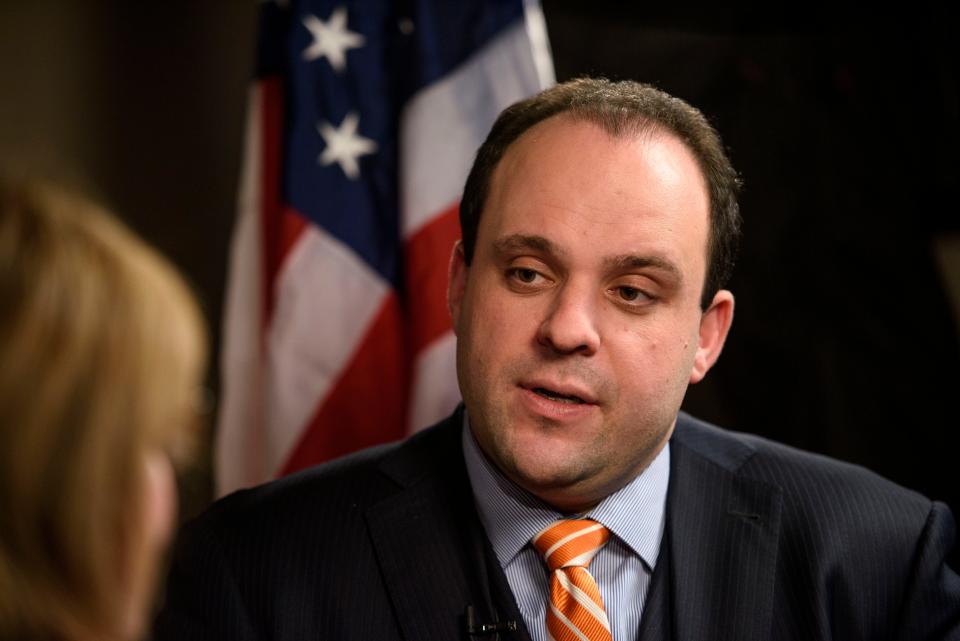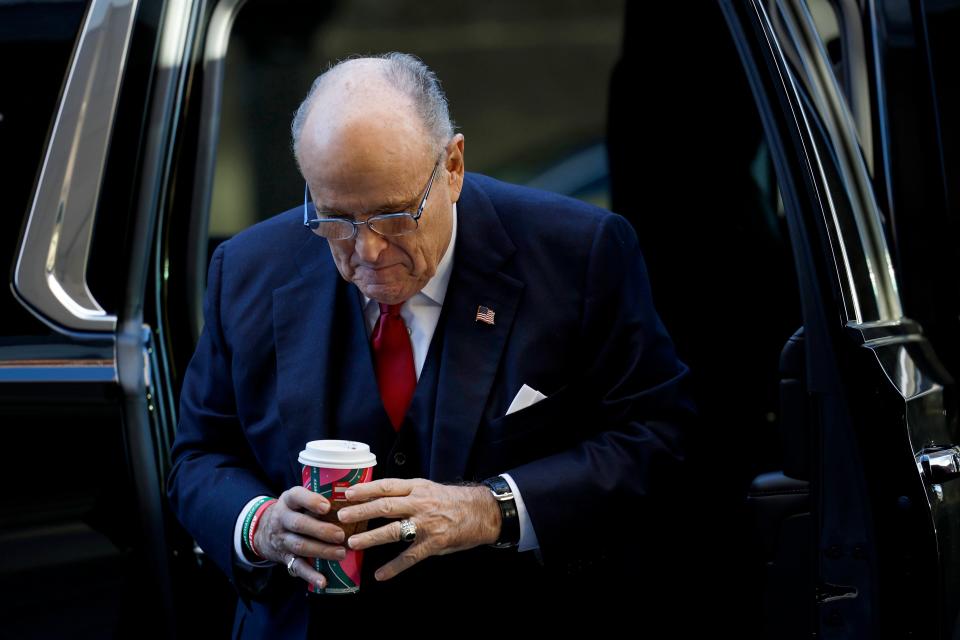Arizona fake electors: Rudy Giuliani taunts prosecutors; Boris Epshteyn asks for delay
The earliest court hearings in Attorney General Kris Mayes' criminal case alleging a plot to subvert the result of the 2020 presidential election may be missing two high-profile allies of former President Donald Trump.
Three weeks after the indictment was issued by a grand jury, the Arizona Attorney General's Office has been unable to serve former Trump lawyer Rudy Giuliani notice that he must appear in court May 21.
The former mayor of New York City is one of 18 people charged with nine felony counts in Arizona, and to date, his name has not been formally released by prosecutors.
Meanwhile, Trump adviser Boris Epshteyn's lawyer asked to delay his client's first court appearance until June, because Epshteyn is "advising in a court proceeding ongoing in another state" through May, court documents say.
Epshteyn has been repeatedly spotted in the New York City courtroom where Trump is on trial over charges he falsified business records. The first criminal trial of a former president alleges Trump sought to hide payments and other efforts to prevent stories of sexual encounters with women from becoming public during his 2016 campaign.
Epshteyn's lawyer did not respond to a call or email seeking comment Tuesday.

That amounts to an unpredictable start of a unprecedented criminal case, one that levies criminal charges against seven former top aides to Trump as he seeks a second term in the White House. Trump is not charged in Arizona.
Former Trump attorney John Eastman is expected to be arraigned Friday morning, while most of the others charged — including Arizona Republicans who claimed to be legitimate electors for Trump four years ago — are due to be arraigned on May 21. Some have asked to appear remotely, court records show.
Catch up: Grand jury indicts fake electors who falsely certified Donald Trump as 2020 winner in Arizona
It is unclear if the apparently elusive Giuliani will be among them.
Agents from Mayes' office spent two days in New York City trying to serve Giuliani notice of the charges against him, according to Mayes spokesperson Richie Taylor. The doorman at the building confirmed he lived there, but would not contact him on the agents' behalf, Taylor said. The office called multiple phone numbers for Giuliani, and sent the summons via certified mail, with no luck.

Taylor said what comes next is to be determined.
"It will be up to the court to decide whether this merits a continuation for the defendant or if other methods need to be taken," Taylor said.
Typically, defendants in white-collar cases are cooperative and accept the summons, said Mark Kokanovich, a former federal prosecutor who now practices law at the firm Ballard Spahr. The alternatives are a public notification, or potentially, an arrest warrant, he said.
Trump trial: Michael Cohen's testimony against Donald Trump delivered for prosecution, if jury believes him
"Usually they would be cooperative because they don't want to be, you know, hounded at a restaurant," he said, adding: "They would rather get it over with."
Mayes' office could request the court issue an arrest warrant for Giuliani, which would mean cooperation with New York law enforcement to bring him to Arizona while in custody, Kokanovich said.
The difficulty Arizona officials had reaching Giuliani stands in contrast to his very public persona, including a steady stream of radio and webcast appearances since the indictment was issued.
The former mayor has continued his false claims the 2020 election was stolen, and was fired from a talk radio station on Friday for continuing to make those claims. On social media, Giuliani denied that he made an agreement not to discuss the election on the show. The Trump ally has continued his social media-based evening show.
A spokesperson for Giuliani did not answer questions about the difficulties contacting him, instead advising a reporter to start watching the show. On Tuesday, Giuliani suggested that because prosecutors could not find him, they couldn't accurately count votes.
It was an apparently broad complaint, though against whom wasn't quite clear. The Attorney General's Office does not count votes in Arizona.
Giuliani was a key figure in Trump's pressure campaign on Arizona Republican leaders, urging them to take various efforts to stand in the way of Democrat Joe Biden's win. He led a meeting in Phoenix after the 2020 election planting claims of voter fraud, and met with GOP legislative leaders in Arizona to discuss a gambit to alter the election results.
Giuliani's continued claims may become fodder for Mayes' deputies as they continue investigating their case.
Kokanovich has previously compared the case, which is built in part on the defendants' own statements on social media about their claims to be electors, to the HBO hit show "The Wire." Specifically, he referenced character Stringer Bell's expletive-laden advice against taking notes on a criminal conspiracy.
Giuliani is going against that advice in a new way: by continuing to record podcasts and radio shows after the indictment, Kokanovich said.
"Don't take notes on a conspiracy, and don't podcast about it afterwards," he added.
Reach reporter Stacey Barchenger at [email protected] or 480-416-5669.
This article originally appeared on Arizona Republic: Arizona fake electors: Giuliani taunts prosecutors
